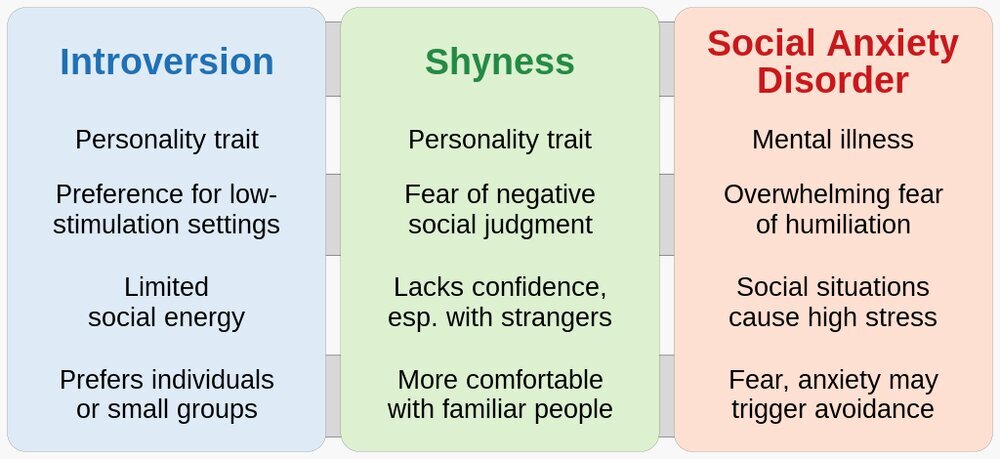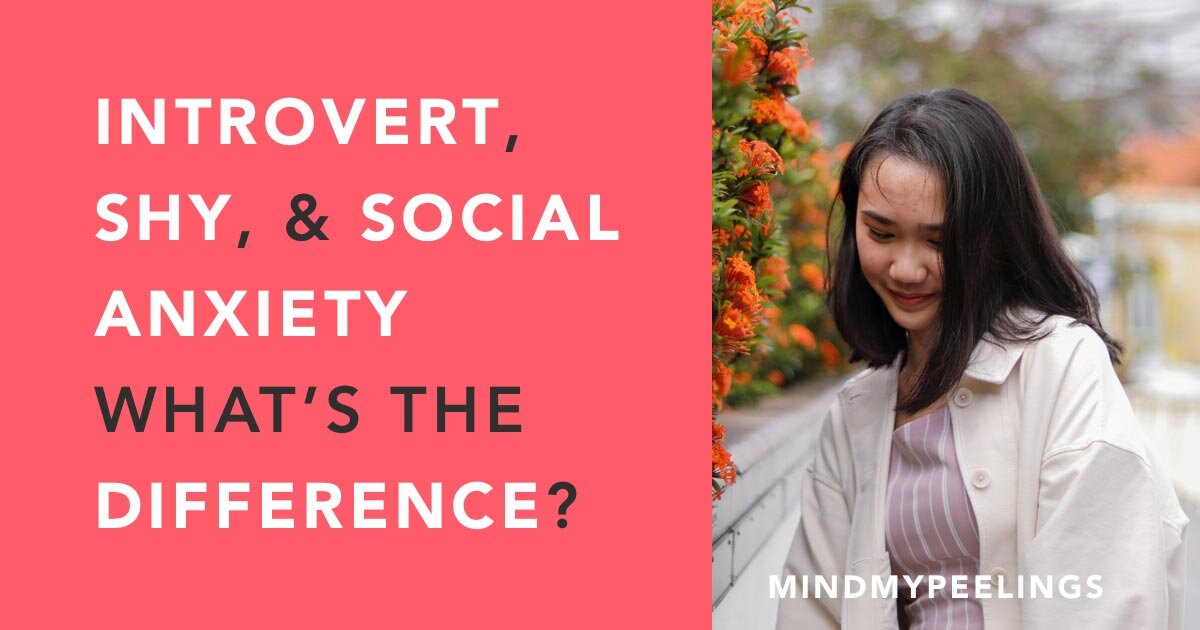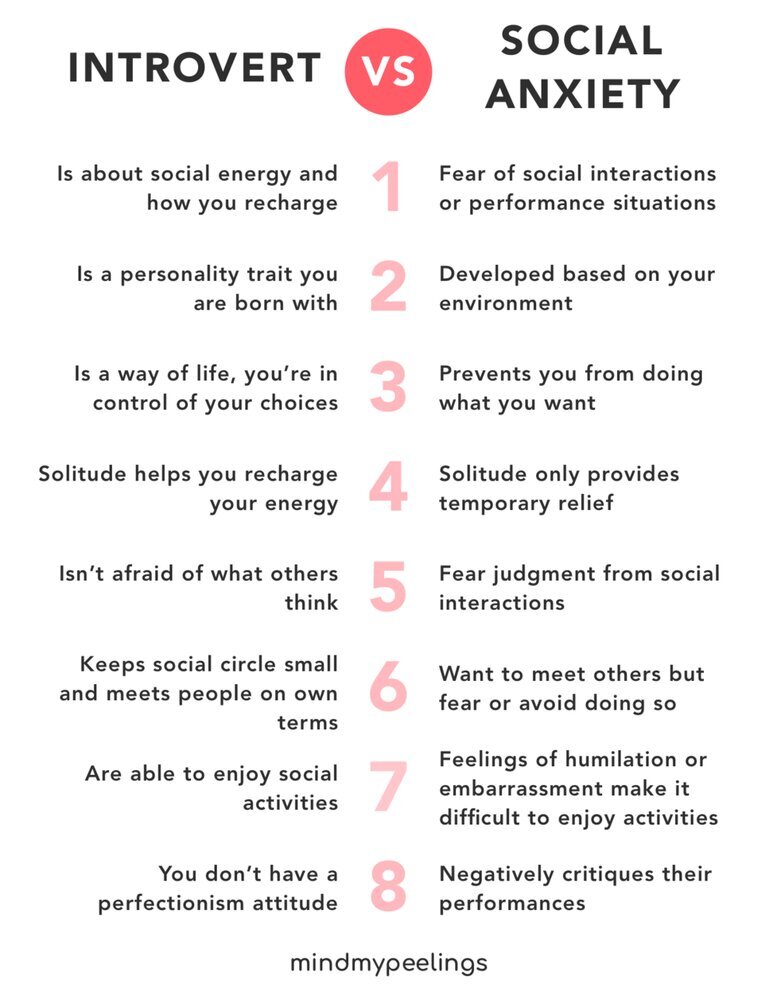David Baxter PhD
Late Founder
Shyness, Introversion, Sensitivity -- What's the Difference?
By Douglas Eby
May 4, 2010
Shyness and introversion may seem to be the same in some ways, at least on the surface. They can overlap, and we may have both traits, but they are not the same thing. And they are not the same as the trait of high sensitivity.
But being shy can be more intense if we are also highly sensitive, and very aware of other people's moods and judgments, and our own inner feelings, such as anxiety.
Shyness vs social anxiety
The Social Anxiety Disorder and Social Phobia site lists some brief definitions that help distinguish the terms :
"I am really shy. I don't like walking into a crowded restaurant by myself; I don't like going to a party by myself." Nicole Kidman
Shy vs HSP
Psychologist Elaine Aron, PhD, says, ?Because HSPs (highly sensitive persons) prefer to look before entering new situations, they are often called "shy." But shyness is learned, not innate. In fact, 30% of HSPs are extraverts, although the trait is often mislabeled as introversion.? [From her site The Highly Sensitive Person.]
In her Psychology Today blog post Time to Find Out: Are You Highly Sensitive?, Elaine Aron writes: ?It?s not new, of course, but has been misnamed as shyness, inhibitedness, neuroticism, or introversion (but 30% of us are extraverts). You can be a high sensation seeker and still be highly sensitive?you may work in media, for example. But you are not impulsive and still need extra down time.?
In Therese Borchard?s interview with me, 5 Gifts of Being Highly Sensitive, I note some of the values of being highly sensitive. We tend to be more aware of our inner emotional states, which can make for richer and more profound creative work.
But being shy or introverted as well as sensitive is likely to impact how we promote ourselves or make social connections that will help enhance creative work.
She adds, "Someone who is introverted and shy will behave differently from someone who is introverted and not shy, who will behave differently from someone who is extroverted and shy, who will behave differently from someone who is extroverted and not shy."
Different kinds of introversion
According to the article Introversion: The Often Forgotten Factor Impacting the Gifted, by Jill D. Burruss and Lisa Kaenzig, introverts belong to two distinct groups:
Group A: Self-sufficient, confident, hardworking, with firm goals, self-actualizing, reserved, preferring activities that involve inner experience and introspection; and
Group B: Shy, timid, withdrawn with low self-concept, lacking in communication skills, demonstrating fear of people, dread of doing things in front of others, who prefer being left alone.
Introversion vs extroversion
Marti Olsen Laney, Psy.D., a researcher, educator, author, psychotherapist and authority on introversion, provides a summary on her site The Introvert Advantage:
Introverts
The article Once a shy monkey, always a shy monkey? on PhysOrg.com reports ?New research by the HealthEmotions Research Institute and Department of Psychiatry at the University of Wisconsin School of Medicine and Public Health (SMPH) and published in PLoS ONE [Public Library of Science] indicates that the brains of those suffering from anxiety and severe shyness in social situations consistently respond more strongly to stress, and show signs of being anxious even in situations that others find safe.
But if shyness is so intense or emotionally disturbing to be considered social anxiety, then it is a mood disorder, which can be improved with medication or therapy.
If it is "just" shyness, maybe self-help anxiety relief programs will help or taking more risks in social situations.
Many actors report they have found relief in acting ? along with a higher level of confidence and esteem. And we can gain those even without performing as actors, such as joining social service groups, taking classes, or doing anything that is more social.
By Douglas Eby
May 4, 2010
Shyness and introversion may seem to be the same in some ways, at least on the surface. They can overlap, and we may have both traits, but they are not the same thing. And they are not the same as the trait of high sensitivity.
But being shy can be more intense if we are also highly sensitive, and very aware of other people's moods and judgments, and our own inner feelings, such as anxiety.
Shyness vs social anxiety
The Social Anxiety Disorder and Social Phobia site lists some brief definitions that help distinguish the terms :
Shyness is a feeling of timidity, apprehension, or discomfort in at least some social situations. This term is often used to describe a personality disposition or temporary event, and less frequently in reference to a mental health concern.
Social anxiety is a feeling of uneasiness, dread, or apprehension about social interaction and presentation. Frequently, the primary concern fueling social anxiety is a concern that one will be (or is being) judged negatively by other people, regardless of whether this is actually the case.
The experience of occasional, mild social anxiety is quite common, as is the experience of anxiety in general. Social anxiety can range from a relatively benign, infrequent level of severity to being a major hindrance in everyday life.
Social Anxiety Disorder or Social Phobia are mental health diagnoses used to describe a level of social anxiety that is so distressing, excessive, and/or pervasive that it is significantly interfering with an individual's quality of life.
The site authors are Andrew M. Jacobs, Psy.D. (Anxiety Treatment and Research Centre, St. Joseph?s Healthcare, Hamilton, Ontario, Canada) and Martin M. Antony, Ph.D., ABPP (Department of Psychology, Ryerson University, Toronto, Ontario, Canada), co-author of The Shyness & Social Anxiety Workbook."I am really shy. I don't like walking into a crowded restaurant by myself; I don't like going to a party by myself." Nicole Kidman
The Psychology Today site on Shyness and Social Anxiety explains, "Shyness is the awkwardness or apprehension some people feel when approaching or getting approached by other people. Unlike introverts, who feel energized by time alone, shy people often desperately want to connect with others, but don't know how or can't tolerate the anxiety that comes with human interaction."Shy vs HSP
Psychologist Elaine Aron, PhD, says, ?Because HSPs (highly sensitive persons) prefer to look before entering new situations, they are often called "shy." But shyness is learned, not innate. In fact, 30% of HSPs are extraverts, although the trait is often mislabeled as introversion.? [From her site The Highly Sensitive Person.]
In her Psychology Today blog post Time to Find Out: Are You Highly Sensitive?, Elaine Aron writes: ?It?s not new, of course, but has been misnamed as shyness, inhibitedness, neuroticism, or introversion (but 30% of us are extraverts). You can be a high sensation seeker and still be highly sensitive?you may work in media, for example. But you are not impulsive and still need extra down time.?
In Therese Borchard?s interview with me, 5 Gifts of Being Highly Sensitive, I note some of the values of being highly sensitive. We tend to be more aware of our inner emotional states, which can make for richer and more profound creative work.
But being shy or introverted as well as sensitive is likely to impact how we promote ourselves or make social connections that will help enhance creative work.
"Oh please be careful with me, I'm sensitive and I'd like to stay that way."
Jewel ? in her song I'm Sensitive
In her post Introversion vs. Shyness: The Discussion Continues, Sophia Dembling says, ?The two get confused because they both are related to socializing ? but lack of interest in socializing is very clearly not the same as fearing it. Schmidt and Arnold H. Buss of the University of Texas wrote a chapter titled "Understanding Shyness" for the book The Development of Shyness and Social Withdrawal.She adds, "Someone who is introverted and shy will behave differently from someone who is introverted and not shy, who will behave differently from someone who is extroverted and shy, who will behave differently from someone who is extroverted and not shy."
Different kinds of introversion
According to the article Introversion: The Often Forgotten Factor Impacting the Gifted, by Jill D. Burruss and Lisa Kaenzig, introverts belong to two distinct groups:
Group A: Self-sufficient, confident, hardworking, with firm goals, self-actualizing, reserved, preferring activities that involve inner experience and introspection; and
Group B: Shy, timid, withdrawn with low self-concept, lacking in communication skills, demonstrating fear of people, dread of doing things in front of others, who prefer being left alone.
Introversion vs extroversion
Marti Olsen Laney, Psy.D., a researcher, educator, author, psychotherapist and authority on introversion, provides a summary on her site The Introvert Advantage:
Introverts
- Enjoy time alone
- Consider only deep relationships as friends
- Feel drained after outside activities, even if they were fun
- Good listener
- Appear calm and self-contained
- Think then speak or act
- Like to be in the thick of things
- Relish variety
- Know lots of people, considers lots of people friends
- Enjoy chit-chatting, even to strangers
- Feel stoked after activity
- Speak or act then think OR think while speaking
The article Once a shy monkey, always a shy monkey? on PhysOrg.com reports ?New research by the HealthEmotions Research Institute and Department of Psychiatry at the University of Wisconsin School of Medicine and Public Health (SMPH) and published in PLoS ONE [Public Library of Science] indicates that the brains of those suffering from anxiety and severe shyness in social situations consistently respond more strongly to stress, and show signs of being anxious even in situations that others find safe.
But if shyness is so intense or emotionally disturbing to be considered social anxiety, then it is a mood disorder, which can be improved with medication or therapy.
If it is "just" shyness, maybe self-help anxiety relief programs will help or taking more risks in social situations.
Many actors report they have found relief in acting ? along with a higher level of confidence and esteem. And we can gain those even without performing as actors, such as joining social service groups, taking classes, or doing anything that is more social.





